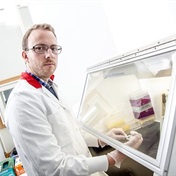Researchers have identified the early master cells that make up the human heart and said they could someday be used to make patches to fix damaged hearts.
The discovery, published in the journal Nature, also sheds surprising light on how human hearts develop in the womb, and how congenital heart disease develops.
"This cell that we describe is probably not going to be used directly as cell-based therapy because it has the possibility of going into too many different cell types," said Kenneth Chien of the Harvard Stem Cell Institute and Massachusetts General Hospital.
But Chien said his team is now looking for intermediate cells that are on their way to becoming beating heart muscle, the cells that line the arteries, and other heart cell types. More immediately, it helps in understand what causes heart disease.
What the findings mean
"The study provides a new way of understanding heart disease as it appears in children and in adults," Chien said. His team worked entirely with human cells and found the human heart develops differently from hearts in mice - a surprising finding.
"The human heart at birth is more than a thousand times bigger than the adult mouse heart, yet the size of the initial embryos are close in size. Humans are just a heck of a lot bigger than mice, and every organ is bigger. How is that achieved?" Chien asked.
In mice, the progenitor cells that Chien's team found exist for just 48 hours. But a mouse develops from conception to birth in just three weeks, while humans gestate for nine months.
And it turns out the human heart develops from patches of these early heart stem cells. Another surprise - these patches of stem cells tend to congregate in areas linked with congenital heart disease, including the heart valves and pumping chambers.
"Congenital heart disease may be a stem cell disease," Chien said. Congenital heart disease affects up to 2% of newborns and often requires surgery within days or weeks of birth.
Possible to grow ‘patches’
Chien does not believe it would be possible to grow entire hearts using the cells - too complicated - but it may be possible to grow patches to fix areas damaged by heart attacks, or faulty valves, he said. Batches of cells could also be used to test drugs for possible unexpected side-effects on the heart.
"Finding a cell that can make all the parts of the heart, including the contracting muscle, the smooth muscle and the vessels, brings us much closer to the possibility of repairing human hearts with new cells," said Dr Doug Melton, who helps direct the stem cell institute.
Stem cells are the body's master cells, the source of all cells and tissue in the body. Chien's team worked with embryonic stem cells, which are found in days-old embryos and which at first can give rise to every cell type.
These cells differentiate as an embryo develops, becoming destined for certain fates as heart cells, nerve cells and so on. Using human embryonic stem cells is controversial as some people object to destroying a human embryo.
Some groups have managed to turn ordinary skin cells into stem cells. They are called induced pluripotent stem cells or iPS calls and Chien wants to try and turn iPS cells into the heart progenitor cells - but says working with true human embryonic stem cells is important.
Banks of human heart progenitor cells might be grown and used for treatments eventually, he said, especially if they can be matched to all the different human tissue and blood types. –(Reuters Health, July 2009)
Read more:
Dead hearts beat again
Stem cell study targets tumours




 Publications
Publications
 Partners
Partners










